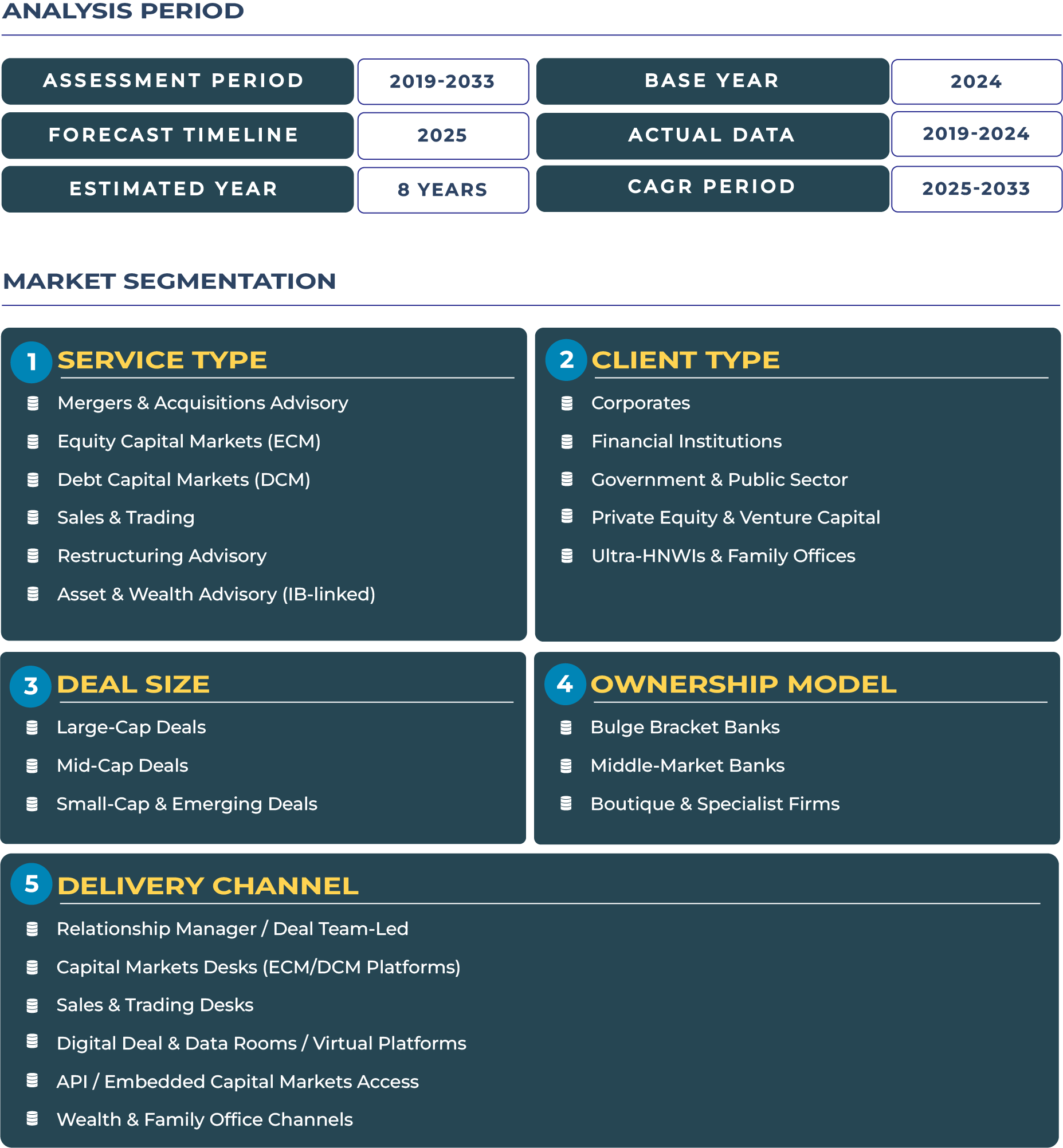Cross-Border Advisory Momentum Reshaping Spain Investment Banking Landscape
Spain investment banking ecosystem is undergoing a strategic transformation driven by the growing importance of cross-border advisory, SME capital access, and mid-market corporate finance. The country’s financial institutions are leveraging advisory capabilities to support enterprises across tourism, manufacturing, technology, and logistics sectors. As international partnerships, regional trade flows, and mid-cap transactions increase, Spain investment banking market is steadily evolving to meet demand for equity capital markets, restructuring advisory, mergers and acquisitions consulting, and debt structuring services.
Note:* The market size refers to the total revenue generated by banks through interest income, non-interest income, and other ancillary sources.
Spain investment banking market is projected to reach USD 6.6 Billion in 2025 and is expected to grow to USD 7.1 Billion by 2033. This moderate growth trajectory is supported by improved European financing conditions, a rise in SME privatization advisory, and increased corporate fundraising linked to real estate, energy, and export-oriented industries. According to DataCube Research, banks are also capitalizing on inbound investments from Western Europe, North America, and the Middle East, driving new mandates for capital structuring and international corporate financing.
Spain’s Ministry of Economy and Digital Transformation is influencing the sector through capital market modernization and regulatory support for transaction transparency. Additionally, private-sector leaders like Banco Santander are expanding advisory services tied to sustainable investments, infrastructure divestitures, and digital platform merger and acquisition.
Spain Investment Banking Market Outlook: Cross-Border SME and Mid-Cap Advisory Gains Momentum
The investment banking market in Spain is increasingly shaped by advisory demand from SMEs and mid-sized corporates seeking cross-border financing, acquisitions, and capital restructuring. Spain’s reliance on tourism, food exports, tech-enabled services, and logistics has created a resurgence in corporate finance activity, particularly among enterprises looking to expand into Western Europe, Latin America, and North Africa. Investment banks are focusing on structured equity placements, debt refinancing, and outbound merger and acquisition advisory to capture value in segmented markets.
Although large-cap transactions remain limited compared to major European hubs, the growing need for cross-border deal facilitation is creating new revenue streams. Investment banks are aligning ECM and DCM teams with restructuring and mid-market deal support to capture mandates from family-owned enterprises, digital service providers, and regional suppliers. International private equity firms have also begun targeting Spanish assets in renewable energy, tourism infrastructure, and transport services, boosting advisory intensity.
Drivers and Restraints: Tourism-Linked Capital Demand vs. Limited Large-Cap Activity
Tourism-Driven Corporate Finance Fuels Advisory and Transaction Volumes
Spain’s globally recognized tourism industry is indirectly stimulating mid-market investment banking demand. Tourism groups, hotel operators, travel-tech platforms, and hospitality asset owners are seeking refinancing, acquisitions, and restructuring support to capture renewed travel traffic. Cross-border advisory services have gained traction due to inbound interest from investors in Italy, France, and the UK. Growth in capital structuring and debt syndication is supported by increased financing interest in regional airports, destination management companies, and eco-tourism developments.
Limited Large-Cap Corporate Activity Restrains Growth
Despite moderate deal flow among growing sectors, Spain’s limited pool of multinational large-cap enterprises restricts higher-value investment banking activities. The concentration of major public companies in sectors like telecom, energy, and finance reduces the number of mega-deals that typically drive ECM and merger and acquisition revenues in larger European hubs. Political shifts, regulatory adjustments, and slow-moving privatization efforts also affect deal certainty. Although some privatization-linked activity is emerging, the pace is slower when compared to markets like France or Germany.
Trends and Opportunities: Rise of Mid-Market and SME Cross-Border Advisory
Mid-Market Advisory Services Expand Across Regional Industries
Investment banking firms are tailoring services for Spain’s mid-market enterprises engaged in acquisitions, divestitures, and expansion financing. Firms are consolidating advisory solutions across debt capital markets and restructuring services to support industrial suppliers, tech-enabled logistics operators, and family-owned manufacturers. Growth in digital platforms and sustainability-linked projects is generating innovative deal structures that combine equity capital, private debt, and hybrid financing instruments.
Cross-Border SME merger and acquisition Creates Structural Opportunities
Spain’s SMEs are seeking inorganic growth opportunities in Latin America, Portugal, Morocco, and Central Europe. This is fueling demand for specialized advisory services focused on corporate valuations, transaction due diligence, and cross-border capital sourcing. Niche players are entering the corporate finance ecosystem with sector-focused advisory models, introducing greater competition and innovation in transaction execution and client retention.
Competitive Landscape: Diversified Strategies Driving Sector Resilience
Spain investment banking competitive ecosystem includes domestic institutions, international banks, and specialized advisory firms. Key players are leveraging acquisitions, digital platforms, and sector-specific advisory teams to expand mid-market and SME coverage. Strategic engagements emphasize merger and acquisition advisory for green energy, tourism expansion, and technology consolidation.
Expansion of Mid-Market Advisory Services Reshapes Competition
Banks and advisory firms are scaling mid-market services to meet client demand for restructuring, divestments, and cross-border capital strategy. A recent example includes Accenture expanding advisory capabilities through its acquisition of Decho to strengthen service provision across health and public service clients. This approach aligns with a broader industry strategy of integrating advisory with technology-enabled transaction facilitation to gain competitive advantages.
International banks are deepening partnerships with local firms to increase deal pipeline velocity, provide access to global capital pools, and enhance transaction value. Domestic players are prioritizing digital client onboarding, corporate debt optimization, and sector-focused merger and acquisition to capture new business among regional enterprises and foreign investors.







